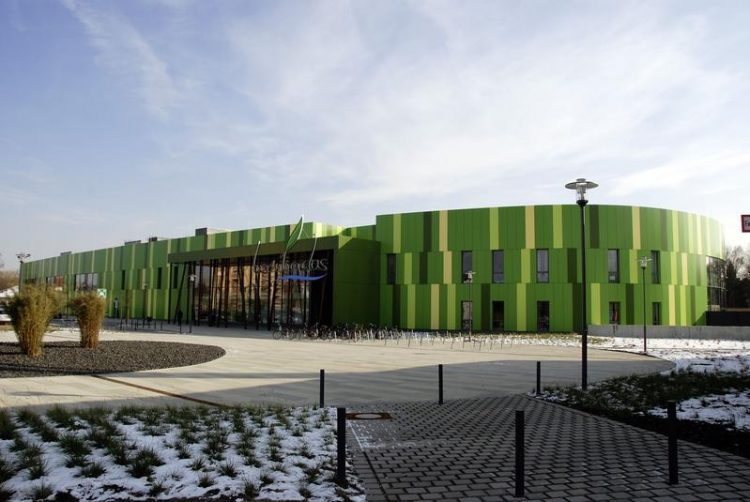Passive house indoor pool saves heat and electricity

The passive-house leisure pool in Bamberg consumes significantly less heat than comparable indoor swimming pools. © Stadtwerke Bamberg GmbH
Monitoring results now available
As a passive house, the leisure pool has a particularly high-quality and tight building envelope. Thanks to the window systems, indoor humidity can rise up to 64% without any condensation. The pools reach into the insulated cellar area, and heat is supplied by a wood gasification CHP and three gas condensing boilers. For the ventilation concept, the interior rooms were zoned for control purposes.
The need-based air exchange rates in the individual zones are guaranteed by eleven ventilation systems with heat recovery. In the course of monitoring, the power consumption of the ventilation system was reduced by 60% as a result of optimisation measures. The swimming pool in Bamberg consumes about 50% less heat energy and 20% less electricity than comparable pools.
The building owners of the leisure pool are Stadtwerke Bamberg, and the scientific monitoring was supervised by the Passive House Institute. The Passive House Institute also scientifically accompanied the first years of the passive house sports pool in Lünen that was built at the same time. The results of both projects will be summarised in a guide for passive house swimming pools in 2018.
You found all informations about the BINE Projektinfo brochure entitled “Fun in a passive house pool” here:
http://www.bine.info/en/press/press-releases/press/pressemitteilung/passivhaus-h…
Uwe Milles/Birgit Schneider
presse(at)bine.info
About BINE Information Service
Energy research for practical applications
The BINE Information Service reports on energy research topics, such as new materials, systems and components, as well as innovative concepts and methods. The knowledge gained is incorporated into the implementation of new technologies in practice, because first-rate information provides a basis for pioneering decisions, whether in the planning of energy-optimised buildings, increasing the efficiency of industrial processes, or integrating renewable energy sources into existing systems.
About FIZ Karlsruhe
FIZ Karlsruhe – Leibniz Institute for Information Infrastructure is a not-for-profit organization with the public mission to make sci-tech information from all over the world publicly available and to provide related services in order to support the national and international transfer of knowledge and the promotion of innovation.
Our business areas:
• STN International – the world’s leading online service for research and patent information in science and technology
• KnowEsis – innovative eScience solutions to support the process of research in all its stages, and throughout all scientific disciplines
• Databases and Information Services – Databases and science portals in mathematics, computer science, crystallography, chemistry, and energy technology
FIZ Karlsruhe is a member of the Leibniz Association (WGL) which consists of 87 German research and infrastructure institutions.
http://www.bine.info/en – BINE Informationsdienst
Media Contact
All latest news from the category: Power and Electrical Engineering
This topic covers issues related to energy generation, conversion, transportation and consumption and how the industry is addressing the challenge of energy efficiency in general.
innovations-report provides in-depth and informative reports and articles on subjects ranging from wind energy, fuel cell technology, solar energy, geothermal energy, petroleum, gas, nuclear engineering, alternative energy and energy efficiency to fusion, hydrogen and superconductor technologies.
Newest articles

First-of-its-kind study uses remote sensing to monitor plastic debris in rivers and lakes
Remote sensing creates a cost-effective solution to monitoring plastic pollution. A first-of-its-kind study from researchers at the University of Minnesota Twin Cities shows how remote sensing can help monitor and…

Laser-based artificial neuron mimics nerve cell functions at lightning speed
With a processing speed a billion times faster than nature, chip-based laser neuron could help advance AI tasks such as pattern recognition and sequence prediction. Researchers have developed a laser-based…

Optimising the processing of plastic waste
Just one look in the yellow bin reveals a colourful jumble of different types of plastic. However, the purer and more uniform plastic waste is, the easier it is to…



